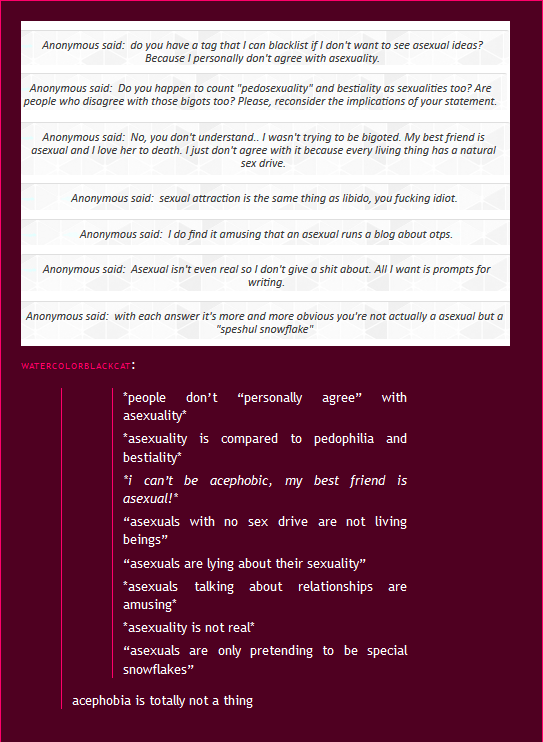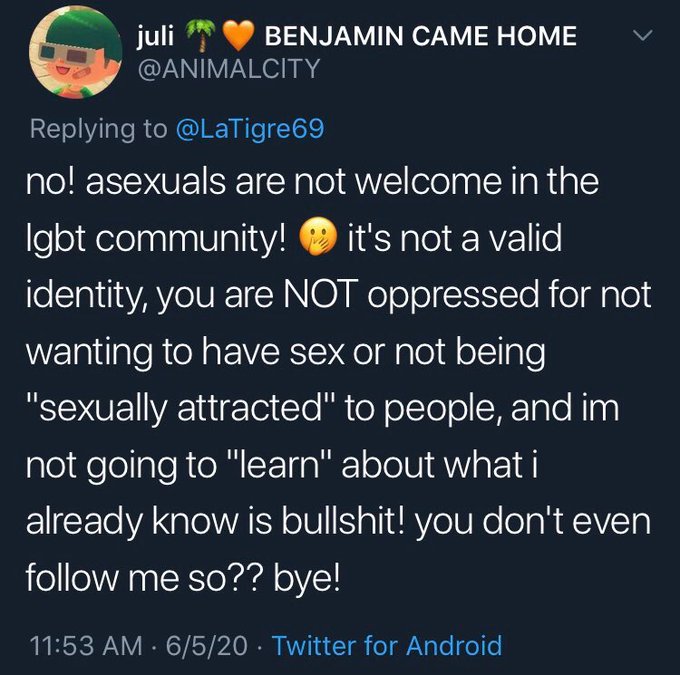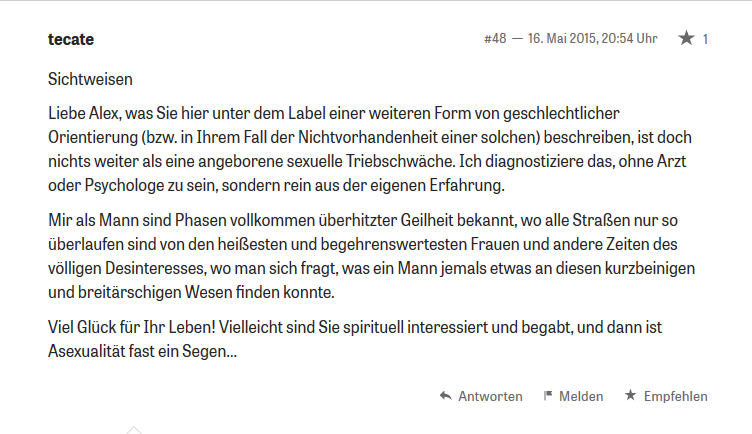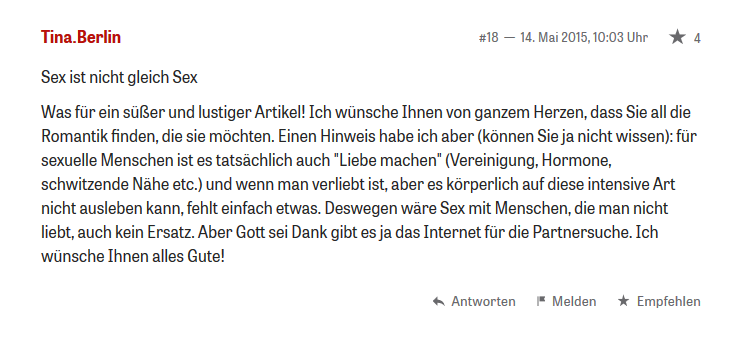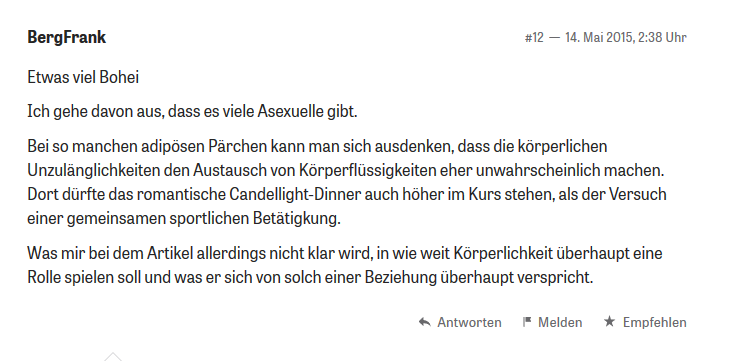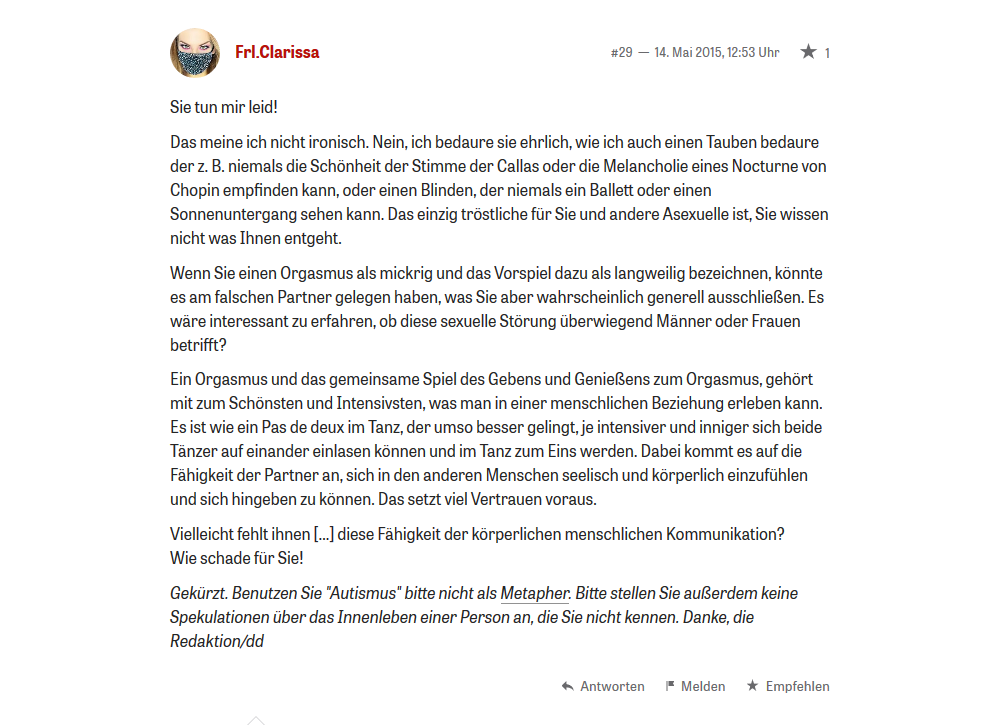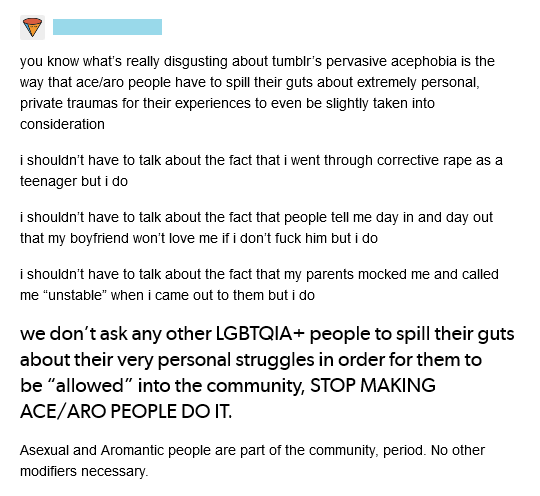○
After being bullied for most of my time in education, it is an issue close to my heart! I was asked to film a video for It Gets Better UK, whose goal is to prevent suicide among LGBTQ+ youth, and I thought I’d share it on my channel as well! I hope it helps someone.
○
Acephobia & Anti-asexual hate crime
Excerpt:
«What is anti-asexual hate crime?
Any offence should be treated as an anti-asexual hate crime if the person who experienced it or anyone else feels it was an expression of acephobia. Anti-asexual hate crime can include verbal abuse and violence from neighbours or strangers. Because people’s asexual identity is not always visible to strangers, anti-asexual abuse can often be concentrated in settings where the targeted person and perpetrator know each other. That can include verbal abuse or unwanted sexual touching from acquaintances and anti-asexual domestic abuse from family or partners. This also includes actual and threats of so-called “corrective” rape, to “fix” the person’s orientation.
These crimes are less easy to recognise but it is equally important to record and address them in a manner that addresses their motivation of hostility. To qualify to be recorded as a hate incident, a report needn’t include anti-asexual language. It is enough for a reporting person to perceive that it was motivated by acephobia.»
Read the whole article here.
○
Alltag einer Asexuellen
“Du bist doch krank!”
Translation: Every day life of an asexual
“You’re sick!”
The following comments were made in a video about asexuality.
Watch the whole video here.
Translated quote:
“It’s¹ human. It’s na… I’m gonna say it’s natural. Sounds shitty, but it’s natural.”
0:28
¹”It” = having sex.
Translated quote:
“I’ll sort her out. I’ll turn her straight² again.”
0:33
²He uses the term “gerade”, which literally translates to “straight”, not to the sexual orientation, while that’s also implied.
Translated quote:
[Interviewer asks what they think why asexual people are asexual]
“They are ugly. *laughs*”
0:45
“Bad experience…”
0:47
Translated quote:
[Interviewer lists comments made regarding asexual people]
“I’m gonna be able to seduce you. Oh God. Something bad probably happened. Oh well, maybe you could try therapy. “
2:40
Translated quote:
[Interviewer asks asexual woman Nicole’s best friend how he felt when she came out to him]
“I’ve already suspected. It wasn’t a big shock, but it was sad nevertheless, that it is the way I thought it would be.”
[Interviewer asks why]
“Because I’d have hoped differently for her.”
7:20
○
ACT Aces: Asexual Experiences Survey
Excerpts:
«“Much Worse Stories”
It is significant in itself that so many respondents chose not to tick clearly relevant boxes because they did not think their experience was “serious enough”.
Many write-in responses began with phrases such as: “So I don’t know if this counts, but…” or “I know other people have had worse stuff…”
I have been catcalled, have had my ass grabbed, and had unsolicited nude photos sent to my phone, i luckily have been only minorly harassed but it still is valid and traumatic and I feel so much empathy for those who have that sexual abuse trauma.
-Taylor (Location Not Given)
Taylor describes having their “ass grabbed” and being sent nude photos without consent, actions which amount to criminal assaults in many jurisdictions. They describe this as being “only minorly harassed” and express compassion for the suffering of others, in part by subordinating their own trauma.
This attitude is representative of many respondents, each claiming others have been through more trauma than themselves, while they seem to want to justify talking at all about their own feelings, even as they diminished them by comparing their trauma to the that of the unnamed and unspecified“others”.»
«81.7% of all respondents reported experiencing at least one form of discrimination, oppression or violence. As the write-in answers led to new forms of abuse being added to each of the three original categories, the final results were consolidated into four new groups.
13.3% of respondents experienced some form of Institutional Discrimination. This primarily covers medical and workplace incidents, but also occasionally schools or religious institutions.
49.9% of respondents either told stories about, or ticked the boxes “Social exclusion” or “Exclusion from LGBTQIA+ spaces”. This also includes a small number of write-in stories that weren’t about specific acts of deliberate exclusion but about feeling excluded by the world in general.
Verbal/Emotional Abuse received the highest number of responses, at 75.4%. This category covers insults, acephobic rhetoric, shaming, and many instances of relationship abuse.
The Physical/Sexual Violence category contains a small number of cases of physical violence, and a larger number of experiences of sexual violence, from unwanted touching to rape. 13.0% of respondents experienced some form of violence.»
«4.1.1. Medical Discrimination (12.2%)
The majority of these stories were about doctors refusing to believe patients about their own sexual history or engaging in unethical, unprofessional or discriminatory behaviour.
There are some stories of doctors refusing to prescribe medication, provide emergency care or discuss issues unrelated to sex as a result of medical professionals fixating on “the libido problem”.
Both medical doctors and mental health professionals such as counsellors and therapists appeared in these stories.
I suffer from major depression, complex ptsd and various other diagnoses, when my doctor asked me about my sex life I briefly said that it wasn’t relevant because of my asexuality. The doctor then wanted to take me off of my meds that I needed, because he felt that my low libido was worse than me having suicidal thoughts. He kept saying it was my meds that caused it; despite me knowing and telling him that I’ve been identifying as asexual since I was 15 which was before I’d gotten on those medications.
He wouldn’t listen. I ended up in the e.r later because I got so depressed and was close to taking my own life. I had to switch doctors and I haven’t told my current one about my asexulity because I’m scared that they’ll take me off my meds again. –Lore (Sweden)
—
I went to urgent care for the third time after I couldn’t get a UTI to heal with the antibiotics they gave me and the female doctor flat out was like, “This is an STD and I won’t give you anymore meds unless you ADMIT you’re sexually active because you’re 26 and 26 year olds have sex. You are not a virgin and you are hurting yourself with your lies.” It was really scarring. –Isabella (USA)
4.1.2. Workplace Discrimination (1.9%)
This was less common than medical abuse, but there were more “Yes” responses than the survey authors expected. Some of the workplace discrimination involved being harassed at work, including sexually harassed. There was one story about being asked deeply personal questions by a boss during a one on one management conversation, and another about being left harassing pamphlets by coworkers.
I had a shift lead who continuously made sexual jokes and asked sexual questions about my life. After telling him im ace, he’s consistuantly made fun of me and encouraged others to make the same jokes and ask me the same questions. He’s also let me go from work early several times because “i cant pull the ‘sell them with sex’ approach with people” (its a pizza shop why the fuck do we have to use sex to sell it???) –Emma (USA)
4.1.3. Religious Exclusion (0.4%)
Write-in answers identified six cases of religious exclusion. These stories primarily related to disapproval of the person’s romantic orientation and insistence on the importance of marriage. These incidents are discussed in more detail in Section 1.6. Religion (pg.18).
My parents are strictly against anything to do with the LBGT+ community. They do not know of my orientation and may never know, but they talk about the community like a plague. And though I still find myself (romantically) attracted to the opposite gender, if they where to find out they would contact the church and be in despair for days. And though I’m unsure if I where to be kicked out, I know I would be shunned. -Sophie (USA)»
«4.3. Verbal/Emotional Abuse
Initially, seven forms of verbal or emotional abuse were included as checkboxes in this section of the survey. Five additional categories were added based on write-in responses (in yellow). These categories are recommended for any future survey.
The largest category, more than three quarters of respondents overall reported experiencing some
form of verbal or emotional abuse. Quantitative data about relationship abuse was not collected, but there was an opportunity to tell a story on that theme: 77 respondents did so. (Several also told stories under sexual violence that also fit this category).
The most frequent offender in the area of relationship abuse was “Asexuality blamed by partner for relationship problems”. 11.79% of respondents checked this box.»
«13% of respondents reported at least 1 incident of physical or sexual violence.
The nature of the stories provided by respondents are in many cases potentially distressing. Included below are some representative examples, and readers are advised to read with caution and be mindful of self -care.
My best friend assualted me when I said i did not want to join her and her boyfriend for a threesome. She threw me on the ground and beat me up, grabbed my hair and held my head back while her boyfriend poured rum down my throat -Linda (USA)
—
In fear of either being raped, physically or mentally abused by someone, I chose to have sex even though I didnt want to. -Quinn (Location Not Given)
—
My now ex-husband required that I provide him with at least two intimate sexual acts each week. Ten years ago he told me that the reason he had an affair and
contemplated ending our marriage was because I was not providing sufficient intimate sexual acts. That threat was held over my head for ten years. Under that duress, I have engaged in sexual acts that I did not want to be a part of at least twice a week for ten years. And it still wasn’t enough – throughout that 10 year period he had multiple affairs and has left me for his most recent sexual partner. -Ruby (Australia)
—
My ex forced himself on me because of my lack of interest in sex and sexual activity. And made me feel extreme guilt because he said I didn’t love him because I wasn’t interested in having sex with him -Lore (Sweden)
—
The first friend I ever told about my asexuality told me I was “too cute to be asexual”. He later took me out for drinks on my birthday, drugged me, and raped me in my own home. He tried to justify it later by saying that I didn’t know my own secret wants.
-Barbara (USA)
—
He raped me many times to try and convince me that I wasn’t asexual, and once time while trying to force my mouth open for oral sex he pulled the bottom bracket off of my braces. If I spoke about being uncomfortable with sex, he would suggest the idea of me drinking to get through it. –Aadya (India)»
«While it is difficult to compare the results of the full cohort (1595 respondents) with that of males only (91 respondents), this one statistic was sufficiently dramatic to warrant discussion.
The percentage of total respondents reporting rape and sexual assault is 4% and 9% respectively. For male-identifying respondents, the figures are much higher: 12% reported rape and 21% reported sexual assault (including the “Sexual Assault by Definition” category).»
«Male respondents who ticked the boxes for sexual assault and rape were less likely to share their story than female and non-binary respondents. Conversely, men who described sexual assaults in their stories were less likely to have checked the corresponding boxes. In many instances they
seemed unaware that what they have described is sexual assault or rape. This raises questions about what men know about consent and their rights to bodily autonomy – whether they are asexual or not.
A reminder must also be added here that the survey authors were unable to identify, except where that information was given, whether a respondent is transgender.»
See the whole survey here.
○
Ein Ass im Bett
Translation: An ace in bed
The following comments were made on an article about asexuality.
You can read the whole article here.
Translation:
Points of view
Dear Alex, what you’re describing here, labeled as a type of sexual orientation (In your case the non-existence of one, respectively) is nothing more than an inherent low sex drive. I’m making that diagnosis without being a medical doctor or a psychologist, but from my own experience.
As a man, I’m familiar with phases of completely overheated horniness, where every street is overflowing with the hottest and most desirable women, and other times of total disinterest where you ask yourself how a man could ever find attractive about these short-legged, fat-assed creatures.
Good luck for your life! Maybe you’re interested and talented in spirituality and then asexuality is almost a blessing…
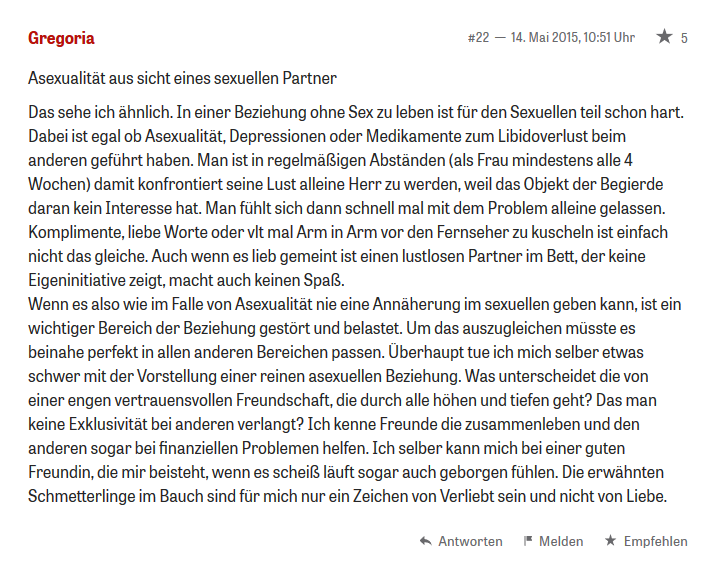
Translation:
Asexuality from the perspective of a sexual partner
I see it similarly. Being in a relationship without sex is hard for the sexual part. It doesn’t matter whether asexuality, depression or medication have caused the other one’s loss of libido. You’re regularly (as a woman at least every 4 weeks) confronted with the task to deal with your lust on your own because the object of desire isn’t interested in it. You quickly feel left alone with the problem. Compliments, kind words or maybe snuggling in front of the TV simply aren’t the same. Even if it’s meant well, being in bed with a listless partner who shows no initiative, is not fun either.
So if there can never be any sexual contact due to asexuality for example, an important part of the relationship is disturbed and strained. To compensate, it would have to be a nearly perfect match in all other areas. In general, I find it difficult to imagine a purely asexual relationship. What distinguishes that from a close, trusting friendship that goes through all ups and downs? That you don’t ask for exclusivity in others? I know friends who live together and even help each other with financial problems. I, personally can even feel secure with a good friend who will help me when things are crappy. The mentioned butterflies in the stomach, to me, are just a sign of being infatuated and not of love.
Translation:
the perfect relationship
Fortunately, today there are tree partnerships for vegetarians
and not just gray ones, but also in voluptuous green shades
add a little oxytocine and every fir branch provides unforgettable, transcending excesses for each icicle.
Translation:
Sex doesn’t equal sex
What a cute and funny article! I wholeheartedly wish you that you’ll find all the romance that you want. However, I do have one piece of advice (you can’t know this): For sexual people, it’s actually also “making love” (connection, hormones, perspiring closeness etc.) and when you’re in love, but can’t physically indulge yourself in this intense way, something’s simply missing. Therefore, having sex with people whom you don’t love, wouldn’t be a substitute. But thank God, there is the internet for dating. I wish you good luck!
Translation:
A little too much fuss
I assume that there are many asexuals.
You can imagine that with some adipose couples, the physical deficiencies make the exchange of bodily fluids unlikely. There, the romantic candlelight dinner ought to be a higher priority than the attempt at a mutual workout.
One thing that the article doesn’t seem to state is to what extent does physicality matter at all and what does he hope to gain from such a relationship.
Translation:
Not the first time
It isn’t the first time that I’ve read such an article online about this topic. I’m interested in this topic, though I’m not afflicted by it myself. One thing I always find remarkable, and that’s that in all these articles, the afflicted never write whether they’ve had a complete checkup? I mean, hormonal etc. and all the way up to their psyche? I always get the feeling that at some point in life, they’ve resigned to this and that’s just how it is. Under normal, natural conditions, the phenomenon asexuality wouldn’t spread, as, strictly speaking, reproduction shouldn’t be happening, that would pass on these genes. It would just occasionally appear as a genetic defect. How much influence our hormones have, regarding our behavior, cannot be emphasized enough. If certain hormones are missing or the opposite, it can lead to extreme conditions like for example the complete loss of smell or other things. My thesis is that a majority of asexual people aren’t merely asexual but that actually a different physical cause is deluding them to believe in this condition, as this condition isn’t of biological value in regard to the conservation of species.
Translation:
Those who want to live without sex, have never had good sex.
That’s a pity, but at some point, it can’t be changed or only with difficulty. In the end, this applies: Live and let live. If asexuality happens willingly, society has to tolerate it. On the other hand, asexuals should also tolerate the sexual nuances of other people. THAT’s how simple life can be.
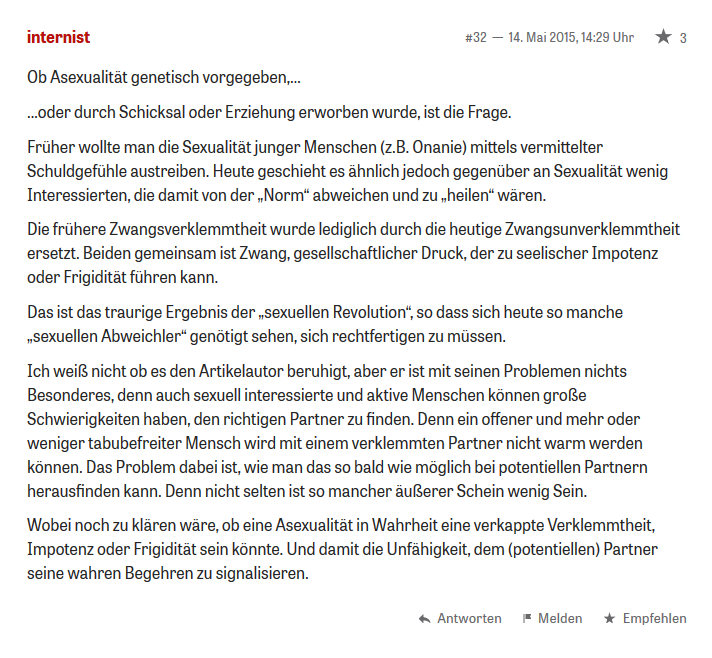
Translation:
Whether asexuality is genetically predetermined,…
…or acquired through fate or nurture, that’s the question.
In the past, people tried to rid young people of their sexuality (e.g. masturbation) via conveyed feelings of guilt. Today this happens in a similar way, but with people who aren’t interested in sexuality much, whom differ from the “norm” and could be “healed”.
The past’s compulsory uptightness has simply been replaced by today’s compulsory uptightness. Both have compulsion, societal pressure in common that can lead to mental impotence or frigidity.
That is the sad result of the “sexual revolution so that today some “sexual deviants” feel compelled to explain themselves.
I don’t know if it will reassure the article’s author, but he isn’t anything special with his problems, because people whom are interested in sex and sexually active can struggle to find the right partner, too. Because an open and and more or less taboo-free person won’t become comfortable with an uptight person. The problem is how to find out as soon as possible with a potential partner. Because quite often, things aren’t as they look at first glance.
It still should be clarified whether asexuality may really be disguised uptightness, impotence or frigidity. And thus, the inability to signal the (potential) partner their true desires.
Translation:
I feel bad for you!
I don’t mean this ironically. I honestly pity you, like I pity a deaf person whom will never experience the beauty of Calla’s voice or the melancholy of a Nocturne by Chopin, or a blind person whom can never watch a ballet or a sunset. The only consolation for you and other asexuals is that you don’t know what you’re missing.
If you call an orgasm meager and its foreplay boring, it could have been with the wrong partner, which you probably rule out on principle. It would be interesting to learn whether this sexual disorder affects more men or women?
An orgasm and the mutual game of giving and enjoyment to the orgasm, is one of the most beautiful and intensive things that you can experience in a human relationship. It’s like a pas de deux at dancing that improves the more intensive and the more intimate both dancers can give themselves to each other and become one in the dance. It depends on the partner’s skill to emotionally and physically empathize with the other person. That requires trust.
Maybe you lack this skill of physical interpersonal communication? What a pity for you!
[Comment by the editor about the use of autism as a metaphor and speculations on people’s thoughts and feelings, which they have removed both.]
○
“Ich bin asexuell”: Was das wirklich bedeutet – und was nicht
Translation: “I am asexual”: What that really means – and what not
The following comments were made on an article about asexuality.
You can read the whole article here.
Translation:
Don’t get me wrong, I think it’s right and good to have places to go to if it’s obvious that your own sexuality isn’t “common”, thus, as developed as in others. Especially during adolescence, you compare and are uncertain and have to find your way. I just don’t understand the motivation to have to come out. If you have a romantic homosexual relationship, you’ll be (hopefully not) discriminated against by homophobes at the most, but it doesn’t matter to the public AT ALL if and how you have sex. That’s only important for yourself.
The coming out and wanting to educate, in my opinion is exhibitionistic. Look at me, I’m different, acknowledge me. That is the message. But most people couldn’t care less if, how and how often you have sex and how you experience it.
Translation:
“We are absolutely a sexual minority, because sexuality doesn’t mean that you have sex.”
sexuality means at least that you have a sexual (that is: carnal) interest. That’s why it’s called SEXuality, not attractionality.
asexuality is the lack of sexuality and sexual interest. That’s why it’s not a sexual orientation. or simply put: bald is not a hair style.
hairstyle is a construct of hair and not possible without hair.
if you don’t find it fitting for yourself, you should not use the term asexual for yourself.
or do you have a compelling reason wanting to be a “sexual” minority?
Translation:
“When people ask me today … how I personally experience sex”
Weird, no one asks me that. No one cares. I wouldn’t give out that kind of info either, because I don’t feel the tiniest need to make intimate matters “visible”.
That asexuals take part in the CSD, seems bizarre to me. It’s like a bald person attending a hairstyle competition. No sexuality isn’t a “different” sexuality, but simply none.
Translation:
Hm… I have trouble understanding your need to come out. As Sany has already said, who even asks something like that? And why is it relevant? In my group of acquaintances, we never ask how often and how much sex someone has and what types (alone, as a twosome or with multiple people) you practice. Or whether someone doesn’t have any interest in sex. I have several coworkers who have been single for apparently forever. But I would never ask them if they are asexual. I wouldn’t know anything about those kind of discussions either.
With homosexual acquaintances, it’s a different level. If you want to live free and open, you’ll also want to show your partner, your way of living. Or one coworker who came out as a woman last year. There it’s more about the societal aspect of acceptance. Whether my acquaintances actually have real sex or whether they just snuggle “romantically”, is none of my business. I find it a little blatant.
Translation:
At some point I’m overwhelmed by all these sexual preferences that you have to come out as. Asexual, aromantic, biromantic but asexual, alone, with multiple people, with different utensils, only in a certain surrounding, … Please don’t misunderstand me. But I agree with Corra. When someone comes out as their sexual orientation, so that he doesn’t have to hide with everything that’s socially a part of a relationship, then that’s right and important for his life. But I don’t want to know what everyone is doing in bed, if you e.g. only experience lust on your own or live in an asexual relationship with a partner. That’s something I’d tell one very good friend at the most. But not in a booth in a pedestrian area. In comparison: I know a coworker’s long-term partner. No big deal. But we don’t tell each other what we each experience in bed. So much for the social relevance of an orientation. ???
Translation:
@thanks KlingtKomisch
I’ve had a good laugh when I continued to read this thread and found a sexual minority in the nonsexual one.
What is that supposed to be? If I don’t drive a car or don’t watch TV, I’d say I won’t care about these topics.
If I don’t care about sex, what am I doing at a demonstration that plays with the manifestation of lived sexuality, if I don’t have anything to play an am not interested in it?
Things are starting to get crazy!
○
Biased Against Asexuals? Let Me Count the Ways
Excerpts:
«Is there really a bias against asexuals? Do other people judge them more harshly? Are they less interested in talking to them? Would they discriminate against them – for example, in hiring?
In a way, bigotry against asexuals seems silly. People who are uninterested in sex are not hurting anyone. They are not disrupting anyone’s life. They don’t engage in the kinds of sexual behaviors that some people consider taboo.
And yet, they are different from heterosexuals, the people who are typically held up as the standard against whom others are judged. Differences can be just that – neutral ways people differ from one another. But as with so many other differences, such as those based on gender or race or marital status, differences are too often viewed as deficits. It is entirely possible that asexuals are seen not just as different, but inferior.»
«Participants were asked to indicate their comfort with hiring members of each of the groups, as well as their comfort with renting to them. Both the college students and the community members felt significantly less comfortable hiring asexuals than heterosexuals, and significantly less comfortable renting to asexuals. They were equally uncomfortable hiring or renting to the other sexual minorities – bisexuals and homosexuals. The key distinction was between heterosexuals and everyone else.»
Read the whole article here.
○
Eleanor is asexual—she wants you to stop saying these five things to #asexual people. What #asexuality stereotypes are you tired of hearing?
Subscribe to PinkNews: http://bit.ly/2HANxkr
Instagram: https://www.instagram.com/pink_news/
Twitter: https://twitter.com/PinkNews
Facebook: https://www.facebook.com/pinknews

